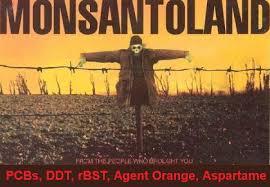 Portland to Sue Agri-Chemical Giant Monsanto Over PCB Contamination
Portland to Sue Agri-Chemical Giant Monsanto Over PCB Contamination
City of Portland to join six other west coast cities in suing Monsanto over PCB clean-up
The city of Portland has announced plans to sue chemical maker Monsanto for costs accrued cleaning up PCBs from contaminated waterways in the Oregon city. PCBs, or polychlolrinated biphenyls are a highly toxic group of chemicals that were manufactured by the company for decades, and which threaten human health as well as that of fauna and flora.
Portland City Council unanimously passed the resolution authorizing city attorney Tracy Reeve to sue the biotech corporate giant. In a statement, Reeve said:
“Portland’s elected officials are committed to holding Monsanto accountable for its apparent decision to favor profits over ecological and human health. Monsanto profited from selling PCBs for decades and needs to take responsibility for cleaning up after the mess it created.”
Joining Seattle, Spokane, Berkeley, San Diego, San Jose and Oakland, Portland is now the seventh West Coast city to sue Monsanto over what was its signature product for decades. The city claims to have spent more than $1 billion cleaning up PCB contaminants from the Willamette River and the Columbia Slough. PCB dumping in the Portland Harbor was one of the main reasons it was declared a Superfund cleanup site in 2000.
PCBs were once used to insulate electronics, and before switching to agriculture in the 1970s, Monsanto was the sole manufacturer of the compound. They churned out over a billion pounds of PCBs between the 1930s and the 1970s, and according to the law firm representing Portland, Monsanto’s own internal documents reveal that the company knew for years that PCBs were dangerous to human health and the environment, yet they did nothing other than continue to manufacture and sell them.
As far back as 1969, Monsanto knew that PCBs led to the contamination of oysters, fish and birds, yet it took another decade before the EPA was able to ban them, overriding fierce resistance from Monsanto.
EPA estimates show that up to 150 million pounds of the chemicals are dispersed throughout the environment, including in the air and in water supplies. There are estimated to be an additional 290 million pounds buried in landfills.
And for its part, Monsanto, ever the corporate do-gooder declined to accept any responsibility. In a statement following the new of Portland’s decision to sue, the company said:
“We are reviewing the lawsuit and its allegations. However, Monsanto is not responsible for the costs alleged in this matter. Monsanto today, and for the last decade, has been focused solely on agriculture, but we share a name with a company that dates back to 1901.”
So we have Monsanto to thank for both PCBs and glyphosate, the cancer-causing ingredient in its signature herbicide Roundup.
Maybe if one company’s business model is repeatedly based on poisoning humanity and the toxification of the planet, that company shouldn’t be allowed to exist.
http://www.nationofchange.org/news/2016/03/18/portland-becomes-7th-city-sue-monsanto-pcb-contamination/
